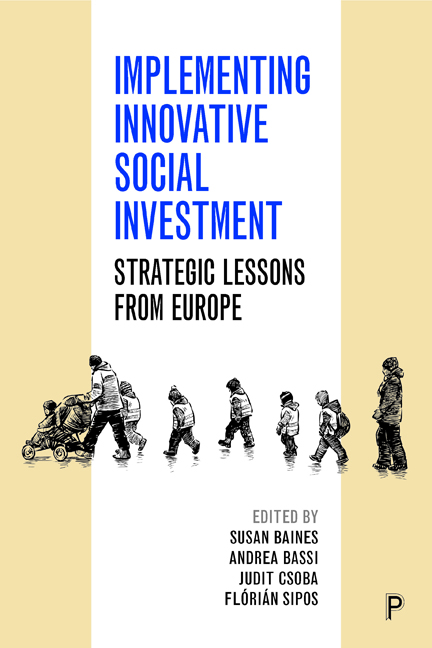Book contents
- Frontmatter
- Contents
- List of tables, figures, images and boxes
- Notes on contributors
- Acknowledgement
- one Social Investment in welfare: a sub-national perspective
- Part A Children and families: early intervention in people’s life courses
- Part B From a caring state to an investing state: labour market activation
- Part C Social solidarity and Social Investment
- Index
twelve - Social Investment in theory and praxis: a ‘quiet revolution’ in innovative local services?
Published online by Cambridge University Press: 21 April 2022
- Frontmatter
- Contents
- List of tables, figures, images and boxes
- Notes on contributors
- Acknowledgement
- one Social Investment in welfare: a sub-national perspective
- Part A Children and families: early intervention in people’s life courses
- Part B From a caring state to an investing state: labour market activation
- Part C Social solidarity and Social Investment
- Index
Summary
Introduction
This book has presented empirical evidence from in-depth, evaluative case studies in 10 European countries. In this concluding chapter, we highlight outstanding themes from the case studies and then go on to put forward a few implications of this research, intended to inform experts, stakeholders and interested readers. Nearly two decades ago, Esping-Anderson and colleagues (2002) made a case for a new welfare state that in the face of heightening uncertainties, would adopt a generational life-course logic. An emerging Social Investment paradigm became widely acknowledged, informed European Union (EU) policy (European Commission, 2013) and became influential worldwide (Deeming and Smyth, 2017). There is now a shared understanding in scholarship and policy of a Social Investment paradigm, albeit sometimes more in the form of ‘engaged discord’ (Hemerijck, 2017: 5) than thoroughgoing consensus.
We begin this chapter by reminding the reader (traveller) of the main stopovers that we took them to visit in this book. It has been a daring journey across 10 European countries (from south to north and from west to east) in order to see social innovation initiatives in the Social Investment policy framework. Thematically, we followed, in turn, the policy domains of early interventions in the life course, active labour markets and social solidarity. Cases were selected because, based on initial understandings of the vision of the projects and programmes, they fitted the Social Investment paradigm and literature, and because there was some evidence of innovation. Most importantly, there was the opportunity for learning.
We started in the north-east part of Italy, in a geographic area that goes from the Apennines mountain chain to the Adriatic seaside, visiting the city of Bologna and the small towns of Serramazzoni and Comacchio. In each of those places, we saw examples of innovation and good practice in Early Childhood Education and Care (ECEC). Then, we moved north-west to Greater Manchester in England, where we learned about the local implementation of a national programme intended to turn around the lives of families with multiple problems. After this, we went north-east to the city of Gothenburg in Sweden and gained insight from an innovative form of collaborative partnership to address the urgent challenges of integrating immigrant children who arrive in Sweden without parents.
- Type
- Chapter
- Information
- Implementing Innovative Social InvestmentStrategic Lessons from Europe, pp. 195 - 214Publisher: Bristol University PressPrint publication year: 2019



